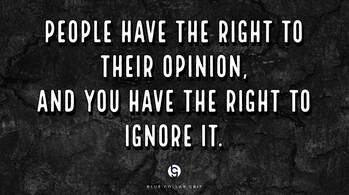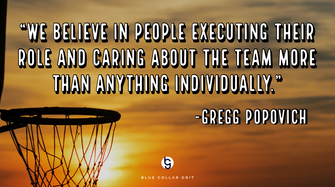Our OpinionsHave you ever noticed that the people demanding their opinion be heard are the last peoples’ opinion you want to hear?
Why is that? I have a few ideas … want to hear my opinion? I knew you did. The Dunning-Kruger effect is a thing, and it’s real. If you’re unfamiliar with the Dunning-Kruger effect, it is a cognitive bias in which people believe they are smarter and more capable than they really are. Basically, we are not smart enough to realize how not smart we are. And, I definitely use ‘we’ intentionally. I catch myself far too often listening to a conversation, just waiting for an opportunity to save the day with my one-of-a-kind wisdom. Once they hear what I have to say, the seas will part, the drawbridge will lift and all will be good. So what is it that drives: 1. Our overestimate of our knowledge and capabilities, and 2. Our desire to share our opinion regardless of our true knowledge of the circumstances? Why Should We Care? Knowing what we know about ourselves and what we’ve been through, it seems pretty natural that we would give significant weight to our personal experiences. They impacted us and played a large part in making us who we are. Why wouldn’t we think they are important. If they mattered to us, why wouldn’t they matter to you? You’ve heard of YouTube, right? It’s pretty clear if you watch a YouTube video on changing the oil in your car, BOOM - you’re a mechanic. If you watch a video on a new baseball drill, BOOM - you’re a coach. That is until we realize we don’t know anything. Unfortunately, the realization of our lack of knowledge is well behind our proclamation of expertise. For most, time will bring understanding. For the others, get used to ignoring them. REAL TALK - Action Steps Here are a few ideas that may help you work through the opinion biases you face.
We are all certainly entitled to an opinion. However, we do not have the right to make other people listen to it. As a leader, it’s critical we recognize our tendency to view our opinions as more factual than they are. Afterall, self-awareness is a superpower. For more information on building excellence in your teams, visit us at www.bluecollargrit.com. We would love to know how we could help!
0 Comments
Bet on PeopleWe lost our last game of the season last week. We had players on our team that had been playing with each other since third grade. Some of them had put in over 3000 hours of work over the last four years. The commitment and work they devoted to their game has been elite, not just for a high school athlete, for anyone in any field.
The only thing more elite than their work ethic is their willingness to embrace sacrifice. They chose to give of themselves for the good of the team. Some were asked to give more than others, but all gave. Each year I’m always humbled by what young people are willing to give up for hope in something bigger than themselves. It’s so cool … and it never fails. Why Should We Care? I chose coaching for the people, but spent a long time doing it for my ego. I wish I could say I never get pulled back into that mentality, but it still happens from time to time. Fortunately, it’s much more rare now. I’m thankful for that. When the ego runs the show, the only person you are really thinking about is yourself. Your goals, your mission, and your status drive the ship. Your happiness is paramount. Your perspective is all that matters. Your problems are the priority. Bet on yourself, right? I’ve played that game. When you lose your last game, that bet doesn’t seem so good. Instantly, you’re not enough. Not only are you less of a coach, but you’re less of a person. Your worth is now in question. The other option? Bet on people. When you lose your last game, you realize it was never about the game. The disappointment is still there, the humiliation is not. The relationships and the process the group chose to operate within are what it’s about. It’s the people that make it awesome. Not the wins, not the trophies, and not the praise … the people. REAL TALK - Action Steps In the pursuit of excellence it’s easy to get sucked into the achievement mindset and forget what this whole leading thing is all about. Here are a few questions that I hope will help you stay focused on the safe bet, the people.
Leadership is a people business. No app or cheat code will help. It is, and always will be, about the people. Keep that fact in the front of your leadership journey. Bet on people. For more information on building excellence in your teams, visit us at www.bluecollargrit.com. We would love to know how we could help! The BestOn the surface this may sound like I don’t care about performing at a high level - like I sacrifice standards to help people feel good about themselves at the expense of achievement.
That’s not the case. I believe strongly in pursuing greatness. I believe the pursuit of excellence is important, really important. I also believe chasing ‘the best’ is fruitless. The modern day stoic, Kenny “The Jet” Smith, summed my philosophy up pretty succinctly on TNT NBA broadcast during a debate on who the greatest basketball player of all time is. The debate usually boils down to Jordan or LeBron and there are hundreds of legitimate arguments on both sides, as well as many more valid arguments for other great players. Kenny made the point, “There is not a greatest, just greatness.” Why Should We Care? In our chase for the best, we dismiss the great. Our constant comparison and justification for our beliefs of judgment on who, or what, is best robs us of the opportunity to appreciate greatness all around us. It’s the judgment that we seek, yet despise, isn’t it? We want to know where we rank compared to others in our arena. It appeases the ego to know that there are others below us, but how does it help us? It doesn’t. It hurts us. If we continue on the ‘best’ path we will eventually find ourselves changing the metrics we measure the ‘best’ by. I mean, afterall, it is completely subjective. Or, if we don’t change the metrics we begin searching for excuses or justifications of why someone else can perform at a higher level than us. These don’t help us become the ‘best’. More importantly, they pull the blinds on the greatness of what we’re doing. They minimize the obstacles we’ve overcome, the purpose we live with, and the process we’ve chosen to take on a daily basis. REAL TALK - Action Steps It’s interesting to me that this approach is perceived by some as non-competitive, or lacking toughness. The competition has, and always will be, with ourselves. We can acknowledge it or deny it, the truth remains.
It’s about performing at our best, not being the best - an arbitrary, subjective judgment. We can control our best. That’s how we provide value to the world and fulfillment to ourselves. Recognize and acknowledge greatness in yourself and others. That’s the best. For more information on building excellence in your teams, visit us at www.bluecollargrit.com. We would love to know how we could help! FakersGrowing up I spent a lot of time playing outside. Jumping bikes, playing football, or just messing around in the creek that ran next to our house would keep me busy for hours. When I had friends over the games we would play obviously escalated in intensity. After all, are there any stakes higher than bragging rights?
The games always turned physical enough that someone was destined to get hurt. This would typically lead to someone bleeding, crying, or limping into the house in search of help, or sympathy, from my mom. She always obliged. The friends, not so much. If blood was present, most accepted the injury as legitimate … most. For some, there was still room for judgment on whether or not the injury was significant for the game to be stopped. And, if mom became involved, shut down. Those that recovered too quickly from an injury ran the risk of garnering one of the most dreadful labels a kid could ever receive - faker. No one wants to play with a faker. Not in childhood games, not in sports, and certainly not in life. So, why do we do it so much? Why Should We Care? Here’s a question to consider that, if you’re honest with yourself, will likely surface an answer that you don’t want to hear: What part of yourself are you willing to be rejected for? The answer for most is not many. We would often rather sacrifice pieces of ourselves in search of acceptance from others than stand by who we are and what we believe. Just consider some of the things we are careful to not be rejected for.
We’ve all been in situations in which we contemplate whether or not to share the truth about any of the above categories. Do we fake it or not? Excellence despises fakers. The two cannot coexist. Living and leading with excellence requires simplicity and alignment. You can’t stand for everything or you stand for nothing. Pick what’s important to you and focus on that. Your belief, thoughts, and actions must match. There is no place for faking it until you make it on a path of excellence. If you feel the need to fake it, stop doing it or change your belief around it. REAL TALK - Action Steps Eliminating the desire to be a faker is a lifelong battle. It’s not something we are going to just start doing and never feel the pull back to being artificial. Society is full of fakers. Here’s a few ideas to make sure you’re not one of them.
Choosing to be a faker is easier, but it’s not problem free. You still get judged. You still have people that don’t like what you’re doing. So why not have people judging you and not liking you for what you actually believe. The security of a faker is a mirage. For more information on building excellence in your teams, visit us at www.bluecollargrit.com. We would love to know how we could help! Role With MeIn our basketball program we run a motion offense. The term ‘motion’ has become extremely watered down over the years to the point that now nearly every offense is some type of ‘motion’. The essence of a true motion offense, however, is randomness. There is no pattern to motion. Offensive players make decisions based on how they are being guarded by the defense. It takes time to teach. Often, a long, long time. It requires players to think and understand the game.
I would consider it a high risk, high reward scenario. When executed well, it’s incredibly difficult to defend. With no pattern, it’s impossible for the defense to anticipate what is coming next. I mean, the offense doesn’t even know until they see what the defense is doing. It’s a great offense. I enjoy teaching it and our players enjoy running it. Each player usually has to make numerous decisions on each possession so there is a built in sense of autonomy from the start. However, there is an important aspect of this decision-making freedom that seems to remain vague on many teams: role embracement. Why Should We Care? Notice I said role embracement, not roll acceptance. That’s a significant difference when we begin considering the execution of each role on a team. And it’s that difference that often separates a good team from a great team. But, before a role can be embraced, or even accepted, it must be clearly identified, articulated, and shared with those we expect to fill it. This step may seem obvious, but it is too often presumed rather than assured - especially in regards to the part of the role that is most important. The corporate world we love to point to a ten year old job description that was created by leaders that have moved on physically, or mentally. It’s complete with a list of bullet points itemizing each duty you are responsible for. This list is important. You need to do them, and probably a lot more, but it’s not the most important. In the sports world, basketball is one of the most difficult sports to clearly define roles simply because all players play offense and defense and they all can pass, dribble, and shoot the ball. This creates a lot of areas for blurring of roles. Players can easily get drawn to the more glamorous role of say, scoring while the team needs him to rebound or screen. The basketball roles of screening, scoring, rebounding, etc is similar to a job description. Your team needs you to do this in order for it to execute at its best. Beyond the job, or basketball, there is another significant role team members must accept that often goes unstated. It’s the same for everyone, though often at varying degrees. So, what makes up the most important part of your role on a great team? Sacrifice, vulnerability, and faith. REAL TALK - Action Steps We, as the leader, must embrace them while also clearly establishing the need for those on our team to do the same. It’s not enough for team members to accept the necessary sacrifice, vulnerability, and faith. They must embrace it - want it - seek it.
As a coach, I used to dread talking to players about the roles we needed them to embrace for the good of our team. I always felt like I was asking them to do something they didn’t want to do. Now, I see role discussions as opportunities to empower players to maximize their contribution to the team. For more information on building excellence in your teams, visit us at www.bluecollargrit.com. We would love to know how we could help! |
About bcI'm a teacher, coach, and parent seeking excellence while defining success on my own terms. Archives
July 2024
Categories |






 RSS Feed
RSS Feed